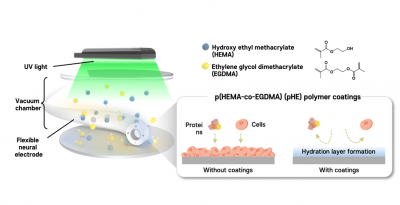Science
Innovative Coating Technology Triples Lifespan of Brain Electrodes

A research team has made significant strides in brain signal recording, extending the lifespan of implanted electrodes from one month to over three months. Led by Dr. Hyejeong Seong at the Korea Institute of Science and Technology (KIST), this innovative breakthrough promises to enhance the capabilities of neural interfaces used in various medical applications.
The collaborative effort with Prof. Seongjun Park from Seoul National University has resulted in a novel coating technology that can significantly improve the durability of these electrodes. This advancement is crucial, as the longevity of implanted devices directly impacts their effectiveness in monitoring brain activity and delivering therapeutic interventions.
Key Features of the Breakthrough
The newly developed coating technology is designed to resist the biological factors that typically lead to electrode degradation. This degradation often results in signal loss and limits the effectiveness of neural implants. By tripling the operational lifespan, the research team aims to provide a more reliable solution for patients requiring long-term monitoring of brain activity due to conditions like epilepsy or neurodegenerative diseases.
According to Sang-Rok Oh, President of KIST, this advancement not only enhances the performance of brain signal recording devices but also opens doors for more extensive research in brain-computer interfaces. The potential applications of this technology could revolutionize how we interact with neural systems and develop treatments for various neurological disorders.
Implications for Future Research
The implications of this breakthrough extend beyond immediate medical applications. With enhanced electrode longevity, researchers can conduct long-term studies on brain activity without the frequent need for replacements, allowing for more comprehensive data collection. This could lead to deeper insights into brain function and new therapeutic strategies.
Additionally, the research team’s work aligns with global efforts to enhance brain-computer interfaces, which are becoming increasingly important in both clinical settings and consumer technology. The ability to record signals over extended periods may facilitate advancements in assistive technologies for individuals with disabilities, enabling them to interact with their environment in new ways.
The findings will be published in an upcoming issue of a leading scientific journal, ensuring that the broader scientific community has access to this essential research. As the field of neuroscience continues to evolve, innovations like this one play a critical role in bridging the gap between technology and medical practice.
In conclusion, the collaboration between KIST and Seoul National University marks a significant milestone in neural interface technology. With the potential to transform patient care and research methodologies, this development highlights the importance of interdisciplinary collaboration in advancing scientific knowledge.
-

 Lifestyle3 months ago
Lifestyle3 months agoLibraries Challenge Rising E-Book Costs Amid Growing Demand
-

 Sports3 months ago
Sports3 months agoTyreek Hill Responds to Tua Tagovailoa’s Comments on Team Dynamics
-

 Sports3 months ago
Sports3 months agoLiverpool Secures Agreement to Sign Young Striker Will Wright
-

 Lifestyle3 months ago
Lifestyle3 months agoSave Your Split Tomatoes: Expert Tips for Gardeners
-

 Lifestyle3 months ago
Lifestyle3 months agoPrincess Beatrice’s Daughter Athena Joins Siblings at London Parade
-

 World3 months ago
World3 months agoWinter Storms Lash New South Wales with Snow, Flood Risks
-

 Science3 months ago
Science3 months agoTrump Administration Moves to Repeal Key Climate Regulation
-

 Business3 months ago
Business3 months agoSoFi Technologies Shares Slip 2% Following Insider Stock Sale
-

 Science3 months ago
Science3 months agoNew Tool Reveals Link Between Horse Coat Condition and Parasites
-

 Science2 months ago
Science2 months agoSan Francisco Hosts Unique Contest to Identify “Performative Males”
-

 Sports3 months ago
Sports3 months agoElon Musk Sculpture Travels From Utah to Yosemite National Park
-

 Science3 months ago
Science3 months agoNew Study Confirms Humans Transported Stonehenge Bluestones









